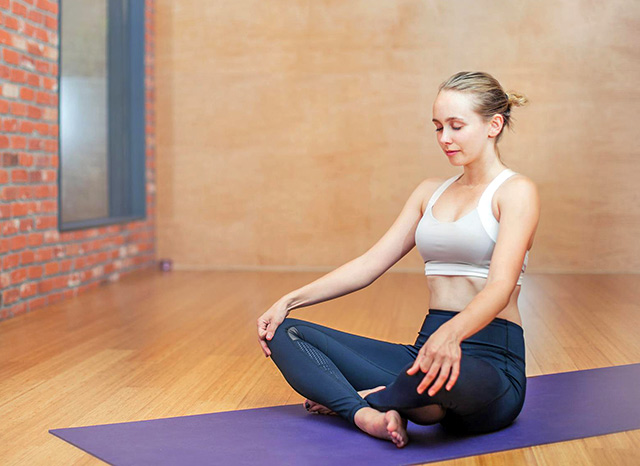We all know that physical activity enhances blood flow and neural connections, leading to increased brain activity. This is what has been proven by various scientists and what we can read in every article online. But what if we say that different sports, and even simple meditation, can stimulate different brain parts? In addition, engaging in physical activity helps us reduce stress and increase our overall mood. Let's look at the main benefits that come to us with sports for our brain activity and boost our satisfaction with our training even more!
 Meditation is good for the brain
Meditation is good for the brainThe benefits of sports and exercise for our brain:
Increased blood flow to the brain
Physical activity can improve brain health and reduce the risk of Alzheimer's disease and vascular dementia. Exercise increases blood flow to the brain, which provides more oxygen and nutrients. Furthermore, it can induce the release of beneficial proteins in the brain that keep brain cells healthy and promote the growth of new neurons. Neurons are the working building blocks of the brain, and their health is essential for overall brain health.
According to the findings of a recent study, blood flow to the brain increases during submaximal and maximal exercise. It also helps to elevate the blood flow to the cortical areas that support locomotion, balance, and cardiorespiratory control.
Increased noradrenaline production
There are many ways that exercise can improve brain health, including improving noradrenaline levels. Research have shown that intense exercise increases neurotransmitters such as norepinephrine and dopamine, which regulate the attention system and boost alertness. In addition, physical activity improves brain metabolism. Noradrenaline levels are essential because they are linked to many mental health disorders. A high neurotransmitter level is associated with anxiety and panic attacks, and low level can lead to a decreased mood or attention span.
Noradrenaline levels are also important for memory retrieval, so increasing this brain chemical can help you focus and learn new things. Exercise also releases endorphins, which are neurotransmitters responsible for feelings of pleasure. This boost makes training easier and enhances your ability to focus.
Expanded hippocampus
Exercise increases the size of the hippocampus, a critical part of the brain that helps us learn and remember things. Various studies have shown that physical activity increases hippocampus size in rats and mice. This finding is particularly important because this part of the brain is vital for forming new memories and transferring information from short-term to long-term memory. In addition, the hippocampus is essential for spatial short-term memory, which helps us navigate. With a faulty hippocampus, people can experience disorientation and memory loss, so try taking up aerobics to develop it most effectively.
Best sports and activities to boost your brain:
Meditation
Studies have shown that meditation improves performance and reduces stress. It has also been shown to improve sleep and the immune system and enhance focus and motor control. Meditation is also a great way to prevent injuries and improve recovery time after sports.
Athletes who meditate before a game may find it helps them concentrate better and play at a higher level. The benefits of meditation for athletes are numerous, and they include improved concentration and focus, a shorter recovery time, and a better sense of self.
Don't worry if you are not a professional athlete, as it may also be useful in your daily life and studies. For example, a single meditation session before getting down to homework will reduce unnecessary stress, making you calmer and more focused and letting you deal with all your tasks without using any paper writing service. In addition, meditation can help to prevent mental health problems.
Martial arts
Practicing martial arts can boost the brain's activity, which is helpful for your overall health. It improves your cognitive function and mood, making you more disciplined as a bonus. As you train your brain, it produces endorphins, natural pain relievers that ease physical discomfort. In addition, martial arts trigger the reward circuitry in the brain, which releases dopamine, or, as it is also known, the "feel-good hormone."
While our brain is mostly multifunctional, martial arts training is particularly beneficial in improving memory. The practice of martial arts training involves complex movements and skills, which require using the brain's executive functions. And they also need to memorize these sets of moves, making their memory constantly exercised just like their body. This is crucial as executive and memory functions are the most important metrics of cognitive performance.
Swimming
Studies show that swimming can improve your short and long-term memory. The fluid movement of swimming enhances the brain's production of chemicals associated with cognition and memory. This can help you focus on tasks that require concentration, and it may even improve your creativity.
Aside from improving your brain's activity, swimming can also increase your mood and focus. It can even reduce stress. While it's not a cure for depression, swimming is a great form of physical activity that benefits the whole body.
Basketball
Regular basketball playing stimulates certain areas of the brain. For instance, regular players have a stronger posterior cingulate cortex compared to non-players. This area governs voluntary memory retrieval, complex motor skill learning, spatial attention-shifting tasks, and oculomotor approach behaviors based on internal expectations. Choosing basketball as your main sport will also lower the risk of developing schizophrenia, depression, and Alzheimer's disease, making it an excellent investment in your future.
Related Pages
- Exercise and the Brain — regular exercise positively impacts brain function and your mental health.
- Head Injury and Concussion in Sports
- Benefits of Exercise
- Sports as Therapy: When your body is kept healthy, it can help maintain emotional health
- Sports Medicine
Disclaimer


 Current Events
Current Events